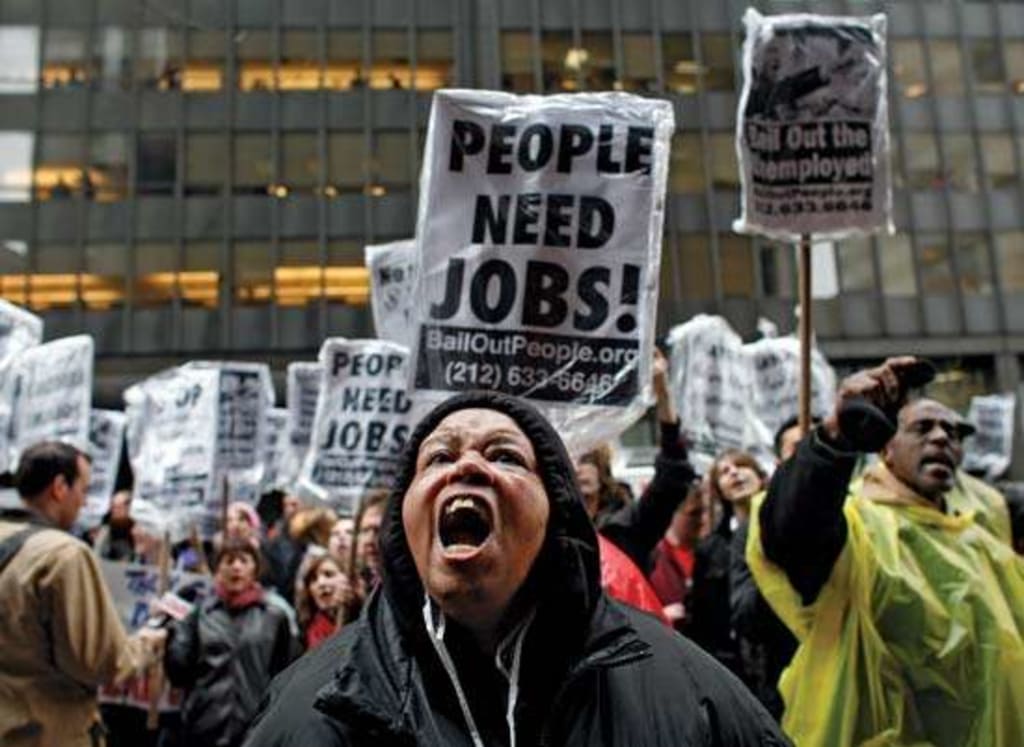
Many citizens of the United States are able to relate to the consequences of poverty: unemployment, homelessness, hopelessness. This can be especially true for those who have suffered through economic hardships, such as the Great Recession of 2008 or the memorable Great Depression. Through the current years of market growth, concerns have risen about the possibility of a recession coming soon. Citizens have already begun to ask for the government’s help in the issue, which would consist of building a program that strengthens the economy to prevent shortcomings in America’s industries. In discussions of a national recession-prevention program, the United States government should take into consideration the nation’s employment rates, international trade partners, and stability within its big banks in order to fully protect the economy from its downfall.
Since almost every market economy thrives because of the interaction and workforce of its people, the employment statistics are very important to analyze when strengthening the United States market. For instance, recently, the nation has been struggling with opportunity because usually, citizens “continue to be subjected to bad jobs or unstable employment,” which has caused a spread of poverty and distress among those who strive to support themselves and their families (William). This has caused many uprisings and protests among many without jobs or decent income, which can be viewed in the image by Jason Decrow. His photo “The Great Recession of 2008-09” depicts many protesters holding banners with demands to receive employment; a woman with a passionate, distraught expression on her face exhibits the desperate tone of the crowd. Unemployment is an apparent issue that people face usually without choice, and even though some would say that a good career comes from persistence and dedicated responsibility, I would have to say that there are many hard-working Americans that still are not given the opportunity to have jobs, despite their motivated attitudes. Without examination of employment rates, the workforce could collapse: a buckle in America’s infrastructure, a backslide in its productivity.
Foreign relations are also so important to any contemporary nation’s economy, that without accounting for it, the U.S. would likely depress rapidly. For example, take a look at one of our allies, Japan, who is currently at risk for economic failure “that would ricochet across world financial markets,” consequently damaging the market of our own nation and reducing national income—a major catastrophe for a state already in debt (Christian Science Monitor). Ultimately, the people would not be able to provide for themselves due to an increase in poverty and inflation, leaving many families in budgetary peril. Also, we see in the opening of “Politics Will Stymie Any Preparation for the Next Recession” by Michael J. Strain, that struggling foreign affairs and economic activity are “reasons to be concerned about a near-term recession,” which solidifies the concept of creating a prevention program in the first place. In other words, weakening relationships with other countries could cause our many much-needed life resources to slowly vanish, like the sun during the winter solstice. Even though the U.S. may be extremely independent in supplies, this type of chain reaction could be the pin that pops our balloon of economic success and international connectivity, posing a potential threat to American taxpayers. Therefore, foreign relations should be monitored very regularly.
The big banks of our nation require stability to maintain the people's income, making their balance very important to track in order to prevent a money scare. Recently, our nation has seen that banks “pay out higher dividends and buy back stock,” allowing them to achieve profit from stakeholders’ debt (Strain). This has obviously been unsympathetically influencing members of these banks, conclusively causing them to lose money almost unfairly. Strain continues to disqualify the usefulness of these practices by inferring that in the past, banks with less debt rather “tend to lend more,” providing them with benefit. So, by pushing the banks in the right direction through a recession-prevention agenda, an occurrence such as the market crash in 2008 would be less likely, and even though banks would probably still try to slyly achieve a profit, as they have done in the past, these new measures could definitely delay their goals from doing so. To protect the people’s wallets and security, the establishment of an economic strengthening system should include the consideration of the responsibility of our nation’s big banks.
From Detroit to the Bronx, poverty and signs of economic recessiveness are everywhere in the United States. By considering the workforce, foreign trade, and the steadiness of banks, a new program could definitely help restrain an oncoming recession. Through the work of the government to compose this effort, people will be much more secure in their finances and togetherness as a society. With a recession-prevention program, our world economy can remain a world economy: thriving and full of opportunity.
Works Cited
"$30 billion tax cut for Japan aimed at preventing recession." Christian Science Monitor, 10 Apr.
1998: 7. MAS Ultra - School Edition.
web.b.ebscohost.com/ehost/detail/detail?vid=6&sid=a1e42200-8053-4e74-9180-8c81fad7a5%40sessionmgr120&hid=125&bdata=JnNpdGU9ZWhvc3QtbGl2ZQ%3d%3d#AN=460205&db=ulh. Accessed 8 Feb. 2017.
Darity, William. “A Guaranteed Federal Jobs Program Is Needed.” The Opinion Pages Room for
Debate, 11 July 2016, The New York Times,
www.nytimes.com/roomfordebate/2016/07/11/are-we-ready-for-the-next-recession/a-gua
ranteed-federal-jobs-program-is-needed. Accessed 8 Feb. 2017.
Decrow, Jason. “The Great Recession of 2008–09.” Photograph. Encyclopedia Britannica, 29
January 2010, www.britannica.com/topic/Great-Recession-of-2008-2009-The-1661642.
Accessed 8 Feb. 2017.
Johnson, Simon. “The Banks Aren’t as Stable as They Need to Be to Weather a Recession.” The
Opinion Pages Room for Debate, 11 July 2016, The New York Times,
www.nytimes.com/roomfordebate/2016/07/11/are-we-ready-for-the-next-recession/the-b
anks-arent-as-stable-as-they-need-to-be-to-weather-a-recession. Accessed 8 Feb. 2017.
Strain, Michael R. “Politics Will Stymie Any Preparation for the Next Recession.” The Opinion
Pages Room for Debate, 27 Sept. 2016, The New York Times,
www.nytimes.com/roomfordebate/2016/07/11/are-we-ready-for-the-next-recession/politi
cs-will-stymie-any-preparation-for-the-next-recession. Accessed 8 Feb. 2017.
About the Creator
Brett Mayfield
Be bold, be bright.
Northwestern University class of '22. Advocate for the unity of people through education.






Comments
There are no comments for this story
Be the first to respond and start the conversation.